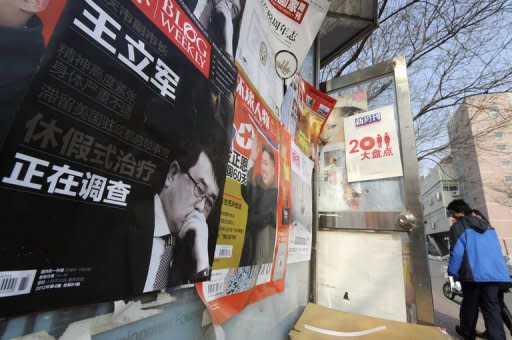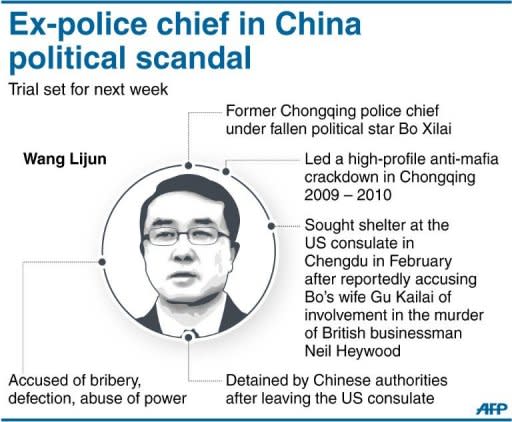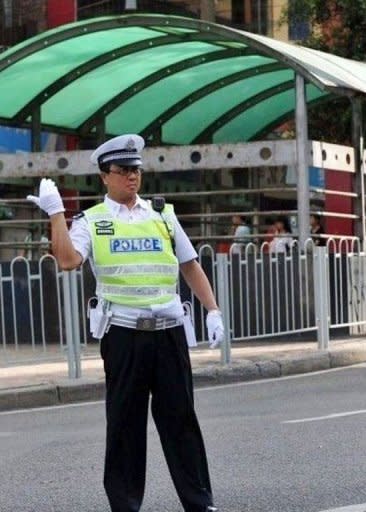Bo Xilai police chief to face trial next week
Bo Xilai's former right-hand man will go on trial next week, a court said, the latest stage in a scandal that has rocked China's Communist party before a once-a-decade power handover. Wang Lijun's flight to the US consulate in the southwestern city of Chengdu earlier this year kicked off the scandal that brought down Bo, a high-profile Communist leader, and led to his wife Gu Kailai's conviction for murder. Wang, who worked as police chief in Chongqing, the Chinese city Bo ran until his downfall, was detained after he fled to the consulate under cover of darkness and reportedly told US diplomats of his suspicions about Gu. "Wang Lijun's case will be heard on September 18," a spokesman for the Chengdu Intermediate People's Court on Friday told AFP of Wang's trial on bribery, defection and abuse of power charges. China's official Xinhua news agency quoted an indictment earlier this month which said Wang had "known beforehand" that Gu was under "serious suspicion" of murdering British businessman Neil Heywood, without taking action. Gu was handed a suspended death sentence for the murder last month, and four of Wang's senior police officers in Chongqing were found guilty of being involved in the murder cover-up. The trial is the latest stage in a scandal that analysts say has exposed deep divisions within the Communist Party ahead of a crucial, once-in-10 years leadership transition due to take place later this year. The bribery charges levelled against Wang make it possible that he could be handed a death-penalty, but Jean-Pierre Cabestan, politics professor at Hong Kong Baptist University said Wang was unlikely to face such a harsh sentence. "I expect Wang will be sentenced to a prison sentence of several decades, a heavy penalty but short of life imprisonment," he said. The trial comes before the Communist Party's 18th party congress -- expected to take place next month -- when China's next generation of political leaders will be formally announced. "(Party authorities) are trying to clean things up before the congress," Cabestan said. The process by which the Party decides on promotions and appointments is highly secretive, but there have been widespread reports of infighting between factions over who will gain high-level political posts. Bo had been tipped for a post on the Politburo standing committee -- China's most senior decision making body -- until the scandal surrounding Heywood's death emerged, apparently ending Bo's political career. Hopes for a smooth transition during the congress were called into question this week after widespread reports that Vice President Xi Jinping, expected to take the Party's top post during the congress, was suffering from an illness. Xi has not been seen in public for two weeks and has cancelled meetings with four foreign dignitaries including US Secretary of State Hillary Clinton. A Chinese government spokesman has repeatedly declined to comment on the speculation surrounding Xi. Earlier this month China's leadership faced rumours that the demotion of Ling Jihua, a top communist party official and ally of President Hu Jintao, was punishment for the alleged death of Ling's son in a gory Ferrari crash. Before his visit to the consulate, Wang cultivated an image of a no-nonsense "supercop" who was profiled in a television series "Iron-Blooded Police Spirits". He even designed and patented a red raincoat for the Chongqing police force. Under the supervision of Bo, then the top party official in Chongqing, Wang led a high-profile anti-Mafia campaign, clocking up thousands of arrests, and provoking accusations of torture sessions and human rights violations. There is still intense speculation about the the future of Bo, who has not been seen in public for months and is thought to be under house arrest.




